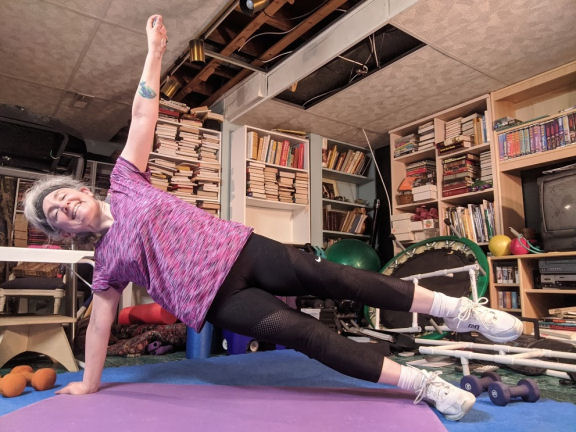Another reason to exercise
We already have lots of reasons to exercise – improve our strength, our cardio ability, strengthen our bones, decrease depression, improve our moods, help us sleep better … (whew!) So here’s another big one to motivate us: exercise reduces severe COVID risk.
Yup – we’ve all been so worried over the last couple of years about severe COVID – the kind that puts us in the hospital or even kills us. But we exercisers have had a secret weapon all along. Since the beginning of the pandemic, doctors have said that exercising reduces the risk of severe COVID outcomes, but there hadn’t been data to support how much exercise is actually needed.
How much exercise do we need?
Do you have to work out like a maniac for an hour every day? Is a stroll after dinner enough? Or somewhere in between, for exercise to reduce the severe COVID risk? A study released just last week studied almost 200,000 adult patients at Kaiser Permanente in California who were diagnosed with COVID-19 between early 2020 and mid-2021. Participants were asked to evaluate their own level of activity prior to their COVID diagnosis. Increments ranged from always inactive (10 minutes or less exercise per week) to always active (300 minutes of exercise per week). We want to do everything we can for our healthy aging, and the CDC’s recommendation is 150 minutes per week.
Researchers found that the more active a patient was before infection, the less their risk of hospitalization or death within 90 days of their diagnosis. “Always inactive patients were 191 percent more likely to be hospitalized and 391 percent more likely to die than those who were always active.”
The more exercise, the lower the risk
The risk of serious infection was reduced for every increment of activity. People who were “consistently active” – 150 minutes or more per week – were 125 percent more likely to be hospitalized and 155 percent more likely to die than the “always active” group. That is a huge decrease from the “always inactive” group!
Everyone benefits from exercise
The researchers also found that the results were consistent across all demographics. No matter the age, gender or ethnic group, people who were more active were less likely to be hospitalized or die from COVID. In fact, researchers even supported the notion that exercise should be promoted as a way to avoid severe COVID.
One thing to note – this research does not make the distinction between people who were vaccinated or not. But, I always want to boost my chances of a good outcome. So I’m going to keep exercising.
